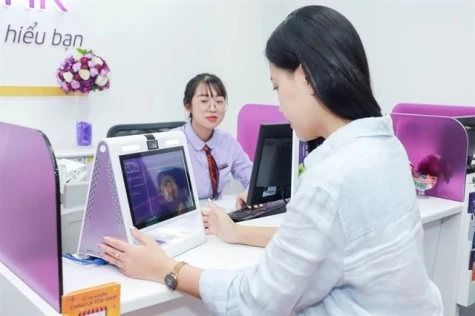Access to this massive amount of data allows banks to expand their digital offerings, particularly online lending.

Banks in Vietnam are developing fully digital lending services, enabling customers to apply for and receive loans entirely through online platforms.
This digital shift benefits customers with greater convenience while allowing banks to cut costs.
The national population database is now connected and synchronised with databases from 18 ministries and sectors, four State-owned corporations, and the administrative systems of all 63 provinces and cities. This integration supports data sharing and enrichment, laying the groundwork for cleaner and more comprehensive datasets.
Access to this massive amount of data allows banks to expand their digital offerings, particularly online lending.
Speaking at a recent conference on digital transformation in the banking sector, Nguyen Thi Ngoan, CFO of MISA, said the company recognised the potential of leveraging this valuable data and launched MISA Lending to connect micro and small enterprises with banks and credit institutions. The platform supports lending based on real-time enterprise data.
To date, loans worth 22.5 trillion VND (887 million USD) have been disbursed via the platform. Some 30% of businesses have successfully accessed credit, ten times higher than traditional models, while maintaining risk levels deemed acceptable by banks.
Vu Hong Phu, a member of MB’s executive board, noted that enterprises with healthy cash flow histories, regular payroll disbursements, and full tax compliance are prioritised for credit approval, possibly without collateral.
In 2024, MB issued unsecured loans based on data to over 4,000 enterprises, reducing processing time by 80%.
“A total of 14,500 disbursement orders were executed automatically in just minutes,” Phu said.
“Previously, each would take two hours; now it only takes five to 15 minutes. This automation saved 36,000 labour hours in 2024, equivalent to 4,500 workdays.”
At VietinBank, corporate clients can now receive disbursements online via the VietinBank eFAST platform. According to Deputy CEO Tran Cong Quynh Lan, the bank has processed over 87,000 online disbursement transactions worth more than 270 trillion VND, with 36% of corporate loans now disbursed online.
Meanwhile, MSB has successfully digitised the entire credit approval process by leveraging national data systems, including tax and invoice data, and the national population database. Thousands of businesses have received loans via digital channels, with approvals granted within minutes.
Dinh Thi To Uyen, Deputy CEO of MSB, said that with machine learning capabilities and access to integrated data, including fintech platforms like MISA, we can approve loans within four minutes. Connecting accounting systems and tax data provides real-time insights into a business’s financial health, which allows us to make immediate lending decisions once customers register and provide basic information.
Banks have been expanding in the personal loan segment through digital channels. Industry experts said that as the digital transformation race in banking accelerates, data cleansing, system integration, and applications of artificial intelligence (AI) and machine learning will become increasingly common. These tools support personalised services, aligning offerings more precisely with customer needs and behaviour. For instance, OCB provides salary-based online loans starting from as little as 100,000 VND.
Banks recognise that competitiveness hinges on more than traditional relationships or proximity. The ability to provide timely, relevant, and convenient services is becoming the defining factor. To enhance security for online lending, banks are ramping up security, using big data and AI to assess borrowers’ credit history, spending behaviour, and business performance before approving disbursements.
Pham Anh Tuan, Director of the Payment Department at the State Bank of Vietnam (SBV), stressed that rising cybercrime requires financial institutions to invest heavily in security.
“As banks use AI to develop products, criminals are also exploiting it for fraud,” he warned.
As a result, SBV will soon introduce regulations requiring service suspension for digital platforms that fail to meet international standards. Service providers must remain vigilant, he said, as cybercrime can happen at any time.
He added that all credit institutions are required to submit information on suspected fraudulent accounts to the SBV to build a shared database. So far, over 350,000 suspicious accounts have been logged, and the database will operate on a win-win principle: institutions that contribute data will also receive shared information in return.
Since April 1, BIDV has piloted a system that notifies customers if a recipient account is flagged as suspicious. In the first month, 40,000 customers were asked to cancel transactions, avoiding potential fraud totalling 160 billion VND. Other major banks, including Vietcombank, MB, VietinBank, and Agribank, are set to adopt this system. After a mid-year review, SBV plans to roll it out sector-wide.
Once fully implemented, the system will offer customers greater peace of mind when transferring funds, helping to reduce fraud. Ultimately, however, the final decision still rests with customers./.
VNA































Xem thêm bình luận